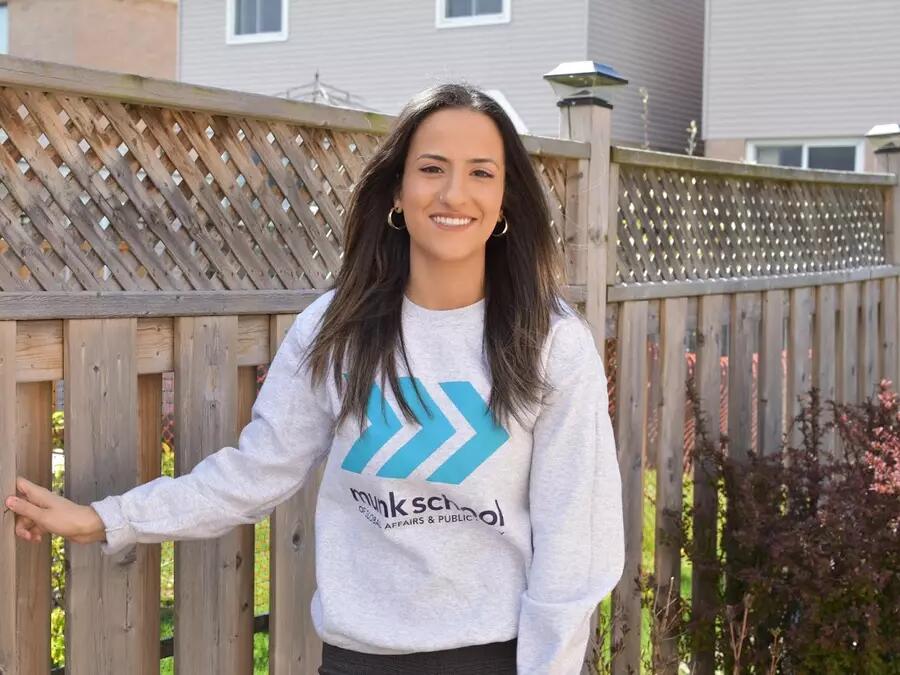
Celebrating Our Graduates: Reem Khalil
For Reem Khalil, deciding to join the Master of Public Policy (MPP) program was a culmination of her life experiences, both big and small. A Palestinian born in a Syrian refugee camp, Khalil saw firsthand how policy can affect daily life. “I saw the pros and cons of policymaking in that context.
For instance, policies related to Palestinian refugees living in Syria allowed residency rights, yet simultaneously opposed complete integration.
As a result, when the war started in Syria, it was really difficult for a lot of my family to leave because many of them didn’t have passports and other required documents that Syrian citizens had. At the time, Palestinians living in Syria became a kind of forgotten population in the context of wider regional conflict,” says Khalil. “But I saw the positives of policymaking too. My parents, for instance, received a really solid education because they had access to UN-funded schools, which isn’t the case for many refugees.”
Khalil held on to those experiences during her undergrad in Global Development Studies at Queens University. But it was a fateful Uber ride that sealed her decision to join the MPP program. “The woman driving the car was in a public administration program and, until that point, I didn’t even know what a degree in public policy actually entailed. Throughout the car ride, she described her program to me, and we reflected on the ways in which effective policymaking can create spaces for marginalized communities to interact with the decisions that directly affect them. After our conversation, I thought, ‘Okay, this seems like a very good transition for me.”
Khalil, who graduates from the MPP program this spring, developed an interest in the intersection of technology and public policy and completed her internship as a policy analyst with AGE-WELL, an organization focused on accelerating the delivery of technology solutions that enable healthy aging. “Tech is so relevant and learning how it intersects with pretty much every policy area is incredibly fascinating to me,” she says.
Khalil also completed a second internship with Genome Canada, an opportunity that arose from a paper she wrote on genomics for Vass Bednar’s Public Policy and Technology course. Khalil also worked for the Policy and Innovation Initiative, a student-led Munk School think tank, as the team lead for a project on machine learning and ethics.
One of the best parts about being in the program, Khalil says, was working as part of the Public Good Initiative (PGI), a student-led pro-bono consulting organization at the Munk School. In her first year, Khalil was a policy consultant, conducting research with the World Education Services on credential recognition services for immigrants and refugees in Canada. In her second year, she became the director of client relations. “We did a lot of outreach to determine where Munk students could contribute most effectively to the policy and research capacity of non-profit organizations, particularly in the context of the COVID-19 pandemic,” she says. Over the past year, the PGI worked with 12 organizations including the Samara Centre for Democracy, the Canadian Civil Liberties Association, University Settlement, and the Federation of Black Canadians. Working with other Munk School students to grow the PGI and support non-profit organizations across the GTA was an incredible experience, she says. “It was an amazing year. It was really nice to see the positive contribution the projects had on organizations, especially the smaller organizations, that we were working with.”
Khalil has also given a significant amount of her time and expertise back to the University of Toronto and the Munk School. In her first year, she worked as a teaching assistant for a third-year course in the Critical Development Studies program. As a second-year student, she mentored first-year MPP students and also worked as a teaching assistant for the first-year MPP Strategic Implementation of Policy Objectives course.
After graduation, Khalil will be working for the federal government, in the International Affairs unit of the Department of Innovation, Science, and Economic Development. She secured the job through an annual networking event for MPP students, usually held in Ottawa but conducted virtually during the pandemic.
“I think that my decision to go to Munk was the best investment I’ve ever made,” she says. “It has a lot to do with the people that I’ve met during my time here. I think it’s very easy to feel underqualified when you’re surrounded by so many well-rounded and accomplished people in the program. But it’s in that environment that I found I was able to learn the most. I ended up learning so much, not just from my courses, but from my friends and the conversations I had with my peers, too.” Khalil also has advice to share with incoming MPP students: “It’s a really rigorous program and it can be tough, but as much as you can, take advantage of the opportunities available to you,” she says. “It’s only two years, so you have half as much time as you did in undergrad! Do as much as you can without over-burdening yourself, because Munk has so much to offer.”
Join the Munk School in celebrating our grads at the University of Toronto’s virtual Spring Convocation 2021 ceremony!
Visit https://www.utoronto.ca/convocation on June 23 at 12:00 p.m. EST to watch the ceremony and use #UofTGrad21 to share your well-wishes on social media.

